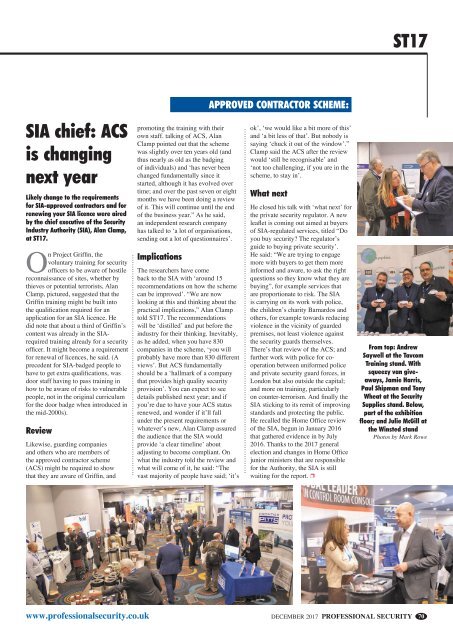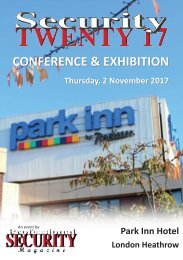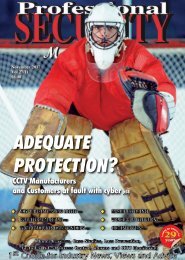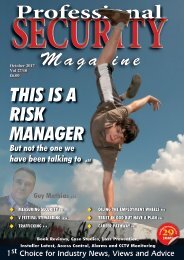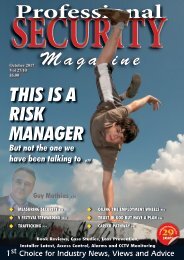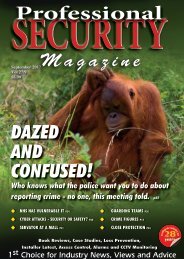Draft27-12
You also want an ePaper? Increase the reach of your titles
YUMPU automatically turns print PDFs into web optimized ePapers that Google loves.
ST17<br />
SIA chief: ACS<br />
is changing<br />
next year<br />
Likely change to the requirements<br />
for SIA-approved contractors and for<br />
renewing your SIA licence were aired<br />
by the chief executive of the Security<br />
Industry Authority (SIA), Alan Clamp,<br />
at ST17.<br />
On Project Griffin, the<br />
voluntary training for security<br />
officers to be aware of hostile<br />
reconnaissance of sites, whether by<br />
thieves or potential terrorists, Alan<br />
Clamp, pictured, suggested that the<br />
Griffin training might be built into<br />
the qualification required for an<br />
application for an SIA licence. He<br />
did note that about a third of Griffin’s<br />
content was already in the SIArequired<br />
training already for a security<br />
officer. It might become a requirement<br />
for renewal of licences, he said. (A<br />
precedent for SIA-badged people to<br />
have to get extra qualifications, was<br />
door staff having to pass training in<br />
how to be aware of risks to vulnerable<br />
people, not in the original curriculum<br />
for the door badge when introduced in<br />
the mid-2000s).<br />
Review<br />
Likewise, guarding companies<br />
and others who are members of<br />
the approved contractor scheme<br />
(ACS) might be required to show<br />
that they are aware of Griffin, and<br />
promoting the training with their<br />
own staff. talking of ACS, Alan<br />
Clamp pointed out that the scheme<br />
was slightly over ten years old (and<br />
thus nearly as old as the badging<br />
of individuals) and ‘has never been<br />
changed fundamentally since it<br />
started, although it has evolved over<br />
time; and over the past seven or eight<br />
months we have been doing a review<br />
of it. This will continue until the end<br />
of the business year.” As he said,<br />
an independent research company<br />
has talked to ‘a lot of organisations,<br />
sending out a lot of questionnaires’.<br />
Implications<br />
The researchers have come<br />
back to the SIA with ‘around 15<br />
recommendations on how the scheme<br />
can be improved’. “We are now<br />
looking at this and thinking about the<br />
practical implications,” Alan Clamp<br />
told ST17. The recommendations<br />
will be ‘distilled’ and put before the<br />
industry for their thinking. Inevitably,<br />
as he added, when you have 830<br />
companies in the scheme, ‘you will<br />
probably have more than 830 different<br />
views’. But ACS fundamentally<br />
should be a ‘hallmark of a company<br />
that provides high quality security<br />
provision’. You can expect to see<br />
details published next year; and if<br />
you’re due to have your ACS status<br />
renewed, and wonder if it’ll fall<br />
under the present requirements or<br />
whatever’s new, Alan Clamp assured<br />
the audience that the SIA would<br />
provide ‘a clear timeline’ about<br />
adjusting to become compliant. On<br />
what the industry told the review and<br />
what will come of it, he said: “The<br />
vast majority of people have said; ‘it’s<br />
approved contractor scheme:<br />
ok’, ‘we would like a bit more of this’<br />
and ‘a bit less of that’. But nobody is<br />
saying ‘chuck it out of the window’.”<br />
Clamp said the ACS after the review<br />
would ‘still be recognisable’ and<br />
‘not too challenging, if you are in the<br />
scheme, to stay in’.<br />
What next<br />
He closed his talk with ‘what next’ for<br />
the private security regulator. A new<br />
leaflet is coming out aimed at buyers<br />
of SIA-regulated services, titled “Do<br />
you buy security? The regulator’s<br />
guide to buying private security’.<br />
He said: “We are trying to engage<br />
more with buyers to get them more<br />
informed and aware, to ask the right<br />
questions so they know what they are<br />
buying”, for example services that<br />
are proportionate to risk. The SIA<br />
is carrying on its work with police,<br />
the children’s charity Barnardos and<br />
others, for example towards reducing<br />
violence in the vicinity of guarded<br />
premises, not least violence against<br />
the security guards themselves.<br />
There’s that review of the ACS; and<br />
further work with police for cooperation<br />
between uniformed police<br />
and private security guard forces, in<br />
London but also outside the capital;<br />
and more on training, particularly<br />
on counter-terrorism. And finally the<br />
SIA sticking to its remit of improving<br />
standards and protecting the public.<br />
He recalled the Home Office review<br />
of the SIA, begun in January 2016<br />
that gathered evidence in by July<br />
2016. Thanks to the 2017 general<br />
election and changes in Home Office<br />
junior ministers that are responsible<br />
for the Authority, the SIA is still<br />
waiting for the report. p<br />
From top: Andrew<br />
Saywell at the Tavcom<br />
Training stand. With<br />
squeezy van giveaways,<br />
Jamie Harris,<br />
Paul Shipman and Tony<br />
Wheat at the Security<br />
Supplies stand. Below,<br />
part of the exhibition<br />
floor; and Julie McGill at<br />
the Winsted stand<br />
Photos by Mark Rowe<br />
www.professionalsecurity.co.uk DECEMBER 2017 PROFESSIONAL SECURITY 70<br />
p68,9 STa 27-<strong>12</strong>.indd 2 18/11/2017 15:16


